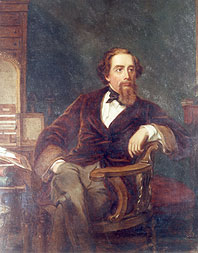|

Charles Dickens was born in Portsmouth, England, in 1812, and spent his early years in Chatham, a town in the coastal county of Kent. When he was about 12 years old, his father was arrested for debt and committed to London's Marshalsea Prison, whereupon Charles was sent, by the agency of a relative, to earn his own keep at Warren's Blacking (a manufacturer of shoe-polish). Forced, alone, to support himself on the meager wages of a child laborer, Dickens was plunged into a period of misery that continued to haunt him for the rest of his life. Partly as a result of his early hardships, his novels show a remarkably developed social conscience. They are frequently concerned with the condition of the poor, and often show a special sympathy for children.
As he grew older, Dickens worked as an office boy, and, by
learning shorthand, entered journalism as a parliamentary reporter. Beginning
to contribute articles and sketches, in addition to his reports on the House
of Commons, Dickens soon became known as the popular journalist "Boz." Boz'
first long work of fiction -- The Pickwick Papers -- was serialized in
1836-7. After the success of Pickwick, Dickens continued to produce serialized
novels, and advanced to the editorship of various periodicals. Great Expectations
was first serialized in All the Year Round -- a journal conducted by
Dickens himself -- from December 1860 to August 1861.
Great Expectations is one of Dickens'
later novels, and appeared in the years of his confirmed success
as a writer. Having purchased a house at Gad's Hill, Chatham --
the town in Kent where he had spent the earlier, happier part of
his childhood -- Dickens wrote much of Great Expectations
overlooking at once the scenes of his youth and those of the novel
he was composing: Pip's market town, in Great Expectations,
is Rochester -- Chatham's sister-city -- and Miss Havisham's home
is based on a house there. Great Expectations was immensely
popular as a weekly serial, and, when published in book form, went
through five editions before the year was out.
Charles Dickens, still one of the most popular of the Victorian novelists, died in 1870.
|


